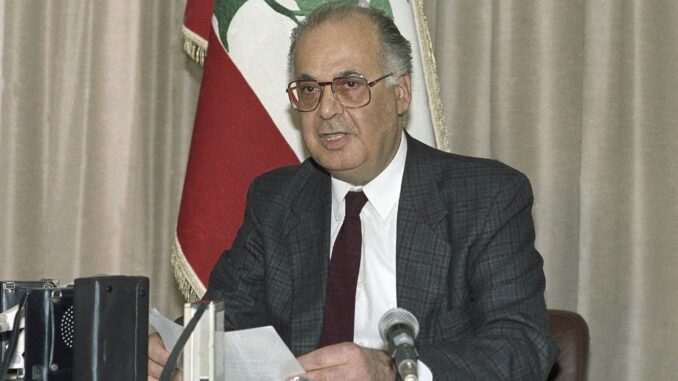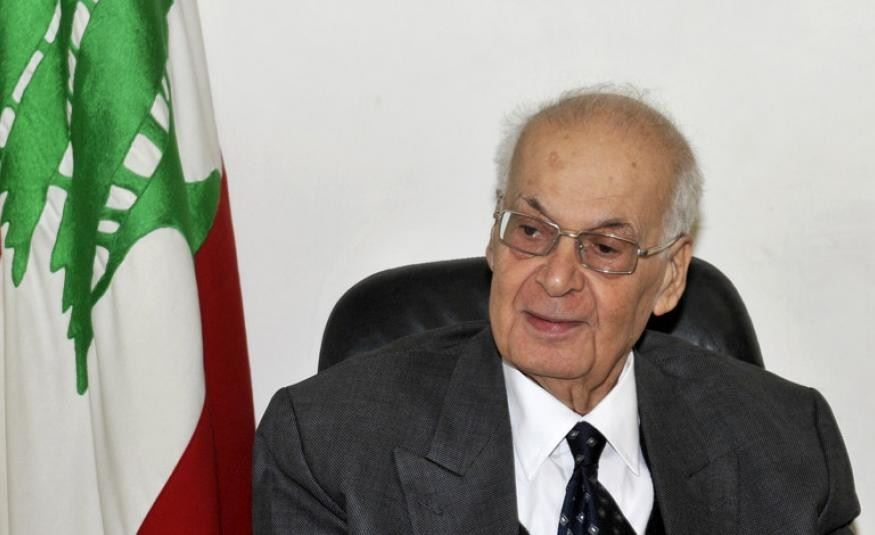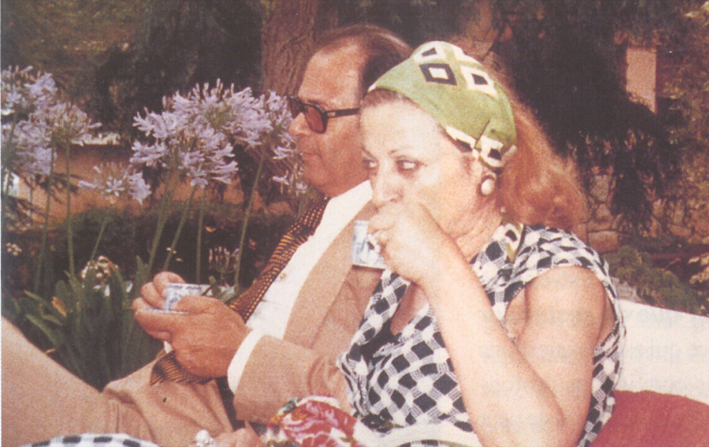
Salim Ahmad al-Huss, also spelled Selim El-Hoss, was a significant figure in Lebanese politics. As a politician who served multiple terms as the Prime Minister of Lebanon, al-Huss was known for his dedication, technocratic approach, and his reputation as a man of integrity. This article delves into his life, tracing his journey from his early days to his legacy as a respected statesman.
Background
Salim Ahmad al-Huss was born on December 20, 1929, into a Sunni Muslim family in Beirut, Lebanon. Tragically, his father passed away when Salim was just seven months old. This loss left a profound impact on his early life, which was further shaped by the turbulent political landscape of Lebanon during that time. In 1941, Salim, along with his mother and grandmother, fled from Beirut to the Sawfar region of Lebanon, seeking refuge from the instability in the city. These experiences played a significant role in shaping his perspectives and future ambitions as a leader.
Education
El-Hoss is a graduate of Indiana University, where he earned a Ph.D. in Economics and Business in 1961. Prior to that, he pursued higher education with zeal, earning a degree from the American University of Beirut (AUB). His education expanded his worldview and prepared him for the complexities of Lebanese politics. El-Hoss is also a member of the Palestine International Institute, showing his dedication to regional and international matters.
Career

Early Beginnings
After earning a degree in economics from the American University of Beirut and a doctorate in economics from Indiana University in the United States, Salim Ahmad al-Huss taught economics at the American University of Beirut for about ten years. Between 1964 and 1966, he served as a financial advisor in Kuwait, and in 1967, he was appointed president of the Central Bank of Lebanon’s commission on bank inspection.
During this period, he formed a close friendship with Elias Sarkis, director of the Central Bank, and later became his advisor when Sarkis was elected president. Al-Huss’s desire to serve his country led him into politics in the 1960s, where he initially focused on economic policies. His expertise quickly made him a valuable asset to the Lebanese government, resulting in his first appointment as Prime Minister in 1976. His early political career was marked by efforts to stabilize the Lebanese economy during challenging times.
Prime Ministerial Terms
Al-Huss served as the Prime Minister of Lebanon multiple times, with his terms spanning from 1976 to 2000. His leadership was often marked by a technocratic approach, focusing on economic reforms and governance. In September 1976, he was first named Prime Minister, also holding the portfolios of commerce, industry, oil, and intelligence. During the Lebanese Civil War (1975–1990), he made efforts to implement an “Arab solution” as recommended at the Cairo summit. After renewed fighting between militias and the Syrian army, followed by the Israeli invasion of 1978, he formed a third national unity cabinet. However, on 25 October 1980, unable to stabilize the internal situation in Lebanon, he resigned as Prime Minister and was replaced by Shafiq Wassan. Despite these challenges, al-Huss remained committed to his principles throughout his career, consistently taking positions that reflected his dedication to integrity and public service.
Challenging Political Landscape
In 1984, Salim Ahmad al-Huss joined the government of Prime Minister Rashid Karame as the Minister of Social Affairs. After Karame’s assassination, President Amin Jumayyil requested al-Huss to form a new government. However, on 22 September 1988, Jumayyil replaced him with General Michel Aoun, who led a military government made up of generals. Al-Huss refused to step down, resulting in Lebanon having two prime ministers for a period. He resigned in the autumn of 1989, and on 13 November, the new President, René Muʿawwad, asked him to form a national unity government. On 31 December 1990, he was succeeded by Omar Karame.
In the 1992 legislative elections, al-Huss led an opposition list against the government’s candidates and was elected as a representative for Beirut. He formed the “Bloc for Salvation and Change,” which attracted influential figures and actively challenged the economic policies of the new Prime Minister, Rafiq Hariri. Although he faced a setback in the 1996 legislative elections, al-Huss joined the National Assembly, which united six prominent opposition figures.
On 2 December 1998, al-Huss became Prime Minister again after General Emile Lahhud was elected president and Hariri declined to form a new government. For the first time, feudal barons and warlords were excluded from the cabinet. Upon assuming office, al-Huss initiated reforms in the Lebanese public service, targeting cadres suspected of corruption. While he earned respect for his management abilities, some within the Sunni community criticized his self-effacing manner, which they believed benefited the presidency of the republic. On 17 October 2000, following the victory of Hariri’s party in the legislative elections, al-Huss stepped down as prime minister, and Hariri resumed the role.
Family

Salim Ahmad al-Huss was a private individual who valued his family life deeply. He was married to Leila Pharaoun, a Maronite Christian who converted to Islam later in life to be buried next to her husband in a Muslim cemetery, as mentioned in a 2000 interview with al-Huss. Although al-Huss had a demanding career, he always found time for his family, keeping them out of the public eye. His family remained a constant source of strength and support throughout his life.
Awards and Recognition
Salim Ahmad al-Huss was widely respected for his integrity and dedication to Lebanon, earning numerous awards and accolades throughout his life for his contributions to politics and public service. These honors reflected his lifelong commitment to improving the lives of the Lebanese people. One significant recognition was the establishment of the Salim El-Hoss Bioethics and Professionalism Program (SHBPP) at the American University of Beirut Faculty of Medicine (AUB FM) and Medical Center (AUBMC). On June 14, 2022, the program held its annual awards ceremony, celebrating the SHBPP-AUB FM Humanism and Professionalism Award and the AUBMC-SHBPP Abdul Wahab Itani Moral Award, further cementing his legacy.
Read Also: Mike Lynch Biography: Background, Education, Age, Career, Family, Net Worth, Death.
Death
Former Lebanese Prime Minister Salim Ahmad al-Hoss passed away on August 25, 2024, at the age of 94, after a long struggle with illness. His death marks the end of an era in Lebanese politics, as his legacy continues to influence the country. Lebanese Prime Minister Najib Mikati issued a statement mourning al-Hoss’ passing, declaring three days of official mourning in Lebanon. Mikati referred to al-Hoss as “Lebanon’s conscience,” lamenting his loss at a time when the country deeply needs his wisdom, national and Arab sense, and good management of public affairs.
FAQs
1. Who was Salim Ahmad al-Huss?
Salim Ahmad al-Huss was a Lebanese politician who served as the Prime Minister of Lebanon and was known for his technocratic approach and dedication to public service.
2. What were the key contributions of Salim Ahmad al-Huss to Lebanese politics?
Al-Huss made significant contributions to Lebanese politics by promoting economic stability, governance reforms, and reducing corruption during his tenure as Prime Minister.
3. What was Salim Ahmad al-Huss’s educational background?
Salim Ahmad al-Huss earned a degree from the American University of Beirut and a Ph.D. in Economics from Indiana University Bloomington.
4. How did Salim Ahmad al-Huss spend his personal time?
Al-Huss enjoyed reading and intellectual pursuits, often spending his free time immersed in books on history, economics, and philosophy.
5. What is the legacy of Salim Ahmad al-Huss?
Salim Ahmad al-Huss’s legacy is marked by his contributions to Lebanese politics, his reputation as a man of principle, and his commitment to public service.

Leave a Reply